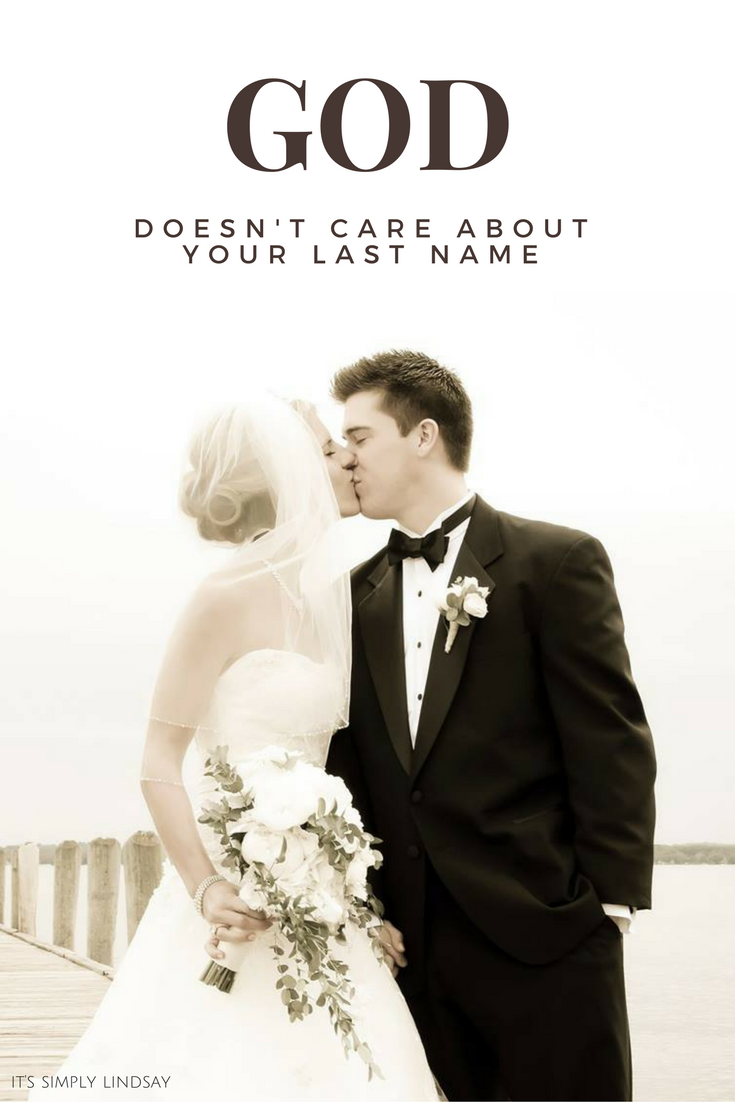
Whenever I write or talk about why I kept my last name after marriage, I’m always prepared for the negative flood of comments and opinions, and in fact, I do enjoy it to an extent. I think it’s important to talk about topics with people who don’t necessarily understand or agree with you, because honestly, if we all knew everything and thought exactly the same way, how boring would life be?
As an educator and lover of learning, I embrace these discussions and am always open to hearing different points of views as I understand that my perspective is just that – mine. It’s not right, wrong, better, or worse – it’s just mine.
I often talk (or write) about a memorable quote from a favorite high school teacher: “Different doesn’t mean better or worse, it just means different.” I strive to live and remember this every day, though for some reason when the topic arises of keeping your last name in marriage, many people are unable to respond in the light of this illuminating quote.
God Doesn’t Care About Your Last Name
The hypocrisy of religion
Unfortunately, one of the main criticisms comes from a religious view point; actually, it’s not religion itself that criticizes me but those who disparage me in the name of religion – a very important distinction.
It’s interesting and topical at the moment because in my high school English class, we’re discussing the hypocrisy of “religious” characters in Frank McCourt’s memoir Angela’s Ashes. Just last week we deliberated what constitutes a “good” and “bad” Catholic – who is the judge of that? How do those people come up with their criterion? Is their measure for goodness and badness of others on the religious scale justified and legitimate? This book illustrates hypocritical characters who are “devout” members of the church or even authorities in the church itself.
I believe judgement is ultimately left up to one being, and if I believe in the same God and religion as my critics, then why do I receive so many ridiculing, sneering, superior comments?
My opposition to my religious critics
I do read all comments, even ones clearly written with a malicious intent, because I try to see things from other points of views. Here is my take on the main arguments from my religious critics.
1. The Bible says nothing about last names: People in biblical times were not identified by their last names. Often times, people were characterized by where they lived (Mary Magdalene) or by their familial associations (Mary the mother of James and Joseph). The Bible doesn’t state anywhere that a woman needs to change her last name in marriage because there weren’t even last names in those times.
This is a Western tradition, and it’s interesting because when one of my posts on this topic went viral on the Huffington Post, it attracted readers from all over the globe. I learned that America is one of the few countries that even has this tradition; it’s purely a cultural custom. Christians and Catholics from all over the globe who live in societies that do not practice this tradition didn’t understand why this was even an issue. Does that make American traditionalists superior to most other religious people across the globe?
2. Man and woman become one flesh: The Bible says that upon marriage, man and woman become one flesh; one way we see this notion in Catholic ceremonies is with the symbolic lighting of the unity candle. Sharing a life, your body, your soul, your joys, sufferings, and dreams are all a part of becoming one with your spouse. To me, my soul is not housed in my name – the passing of names (and surnames themselves) are cultural constructs, not a God-given part of my soul. My relationship with my husband is built on solid values and principles that the church teaches, and our relationship is between us and God.

3. The husband is the head of the wife: Of course there is the bit about submission in marriage: “For the husband is head of the wife, just as Christ is the head of the church, His body, of which He is the Savior. Now as the church submits to Christ, so also wives should submit to their husbands in everything. Husbands, love your wives, just as Christ loved the church and gave Himself up for her.”
This is always a critic favorite, but here is my take. Why is it assumed that a husband wants and requests his wife to submit to him in the way of taking his name? It seems a little pompous and perhaps even silly to self-impose Western views in this interpretation. If my husband is “loving his wife” and “gives himself up to her” just as Christ did for the church, and if his choice is to allow me the freedom to choose what I want, then I am submitting to him.

I understand people will view this submission differently, but also keep in mind that not every man wants his wife to A. submit at all or B. submit in the way you believe is right. There is always more than one point of view, and after all, different doesn’t mean better or worse, it just means different.
And it’s not all about submission because “husbands ought to love their own wives as their own bodies; he who loves his wife loves himself. For no one ever hated his own flesh, but nourishes and cherishes it, just as the Lord does the church.” The way my husband loves and cherishes me may be different from yours or what you would expect, but that doesn’t make your way right and ours wrong.
4. Man leaves family: “That is why a man leaves his father and mother and is united to his wife, and they become one flesh.” If the man is leaving his family to be united with his wife and start a new family unit, why would he keep his family name that he’s meant to leave? If scripture says that a man leaves to establish a new family unit, he shouldn’t be clinging on to his former family name anyway.

5. Lifelong commitment: “For the woman which hath an husband is bound by the law to her husband so long as he liveth.” Critics say that changing your name shows this permanent commitment to your husband, one by which you’re inseparably linked to him. But my goodness, if your name is what’s linking you forever to your husband, I have far bigger concerns about the state of your relationship – although that’s not my place actually – who am I to judge?

Lasting thoughts
If you leave with nothing else today, please live in the spirit of acceptance, openness, and knowing that different doesn’t mean wrong or bad. After all, Socrates said that “I am the wisest man alive, for I know one thing, and that is that I know nothing.” So next time you’re feeling superior, judgmental, or all-knowing, take a pause to consider those wise words.














